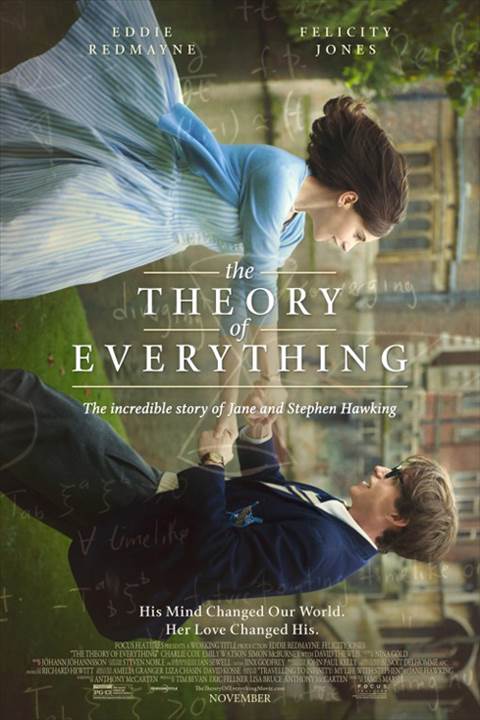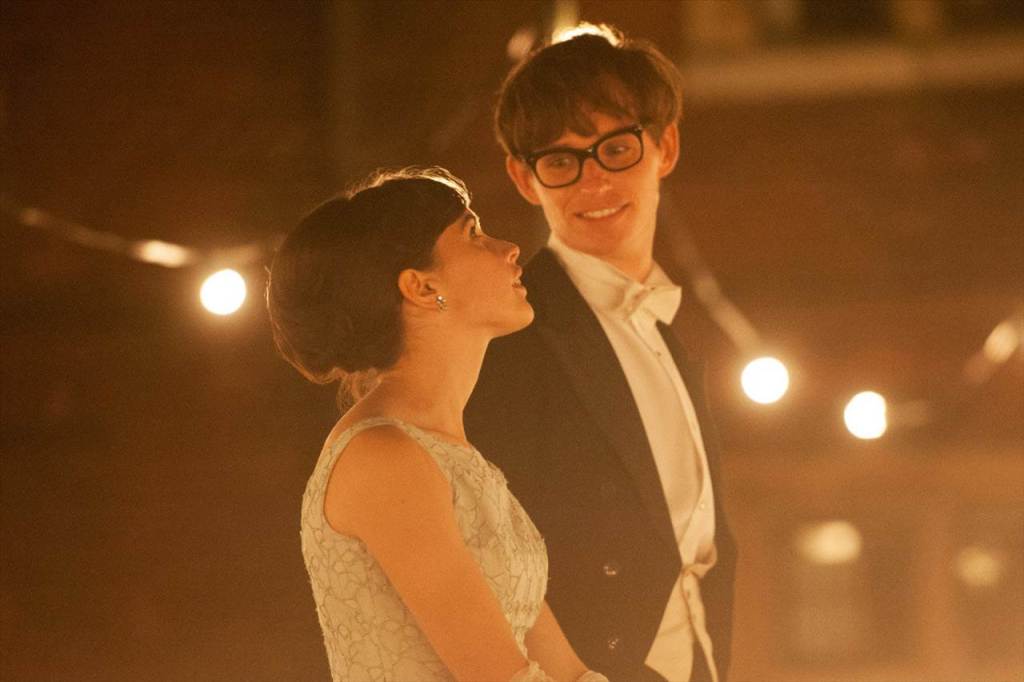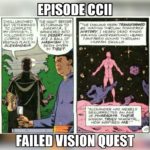Based on the SECOND memoir published by Jane Wilde Hawking, “The Theory of Everything” is not so much a biopic about the world’s most well known physicist as it is an examination of a marriage enduring great obstacles and challenges, and the toll these challenges take on the people involved.
“The Theory of Everything” starts with Stephen Hawking’s (Eddie Redmayne) first year studying for his doctorate at Cambridge University, where he meets a fetching young art student named Jane (Felicity Jones), and they hit it off and embark on the beginning of a nice little relationship. At the same time Stephen is trying to figure out what his ultimate thesis at school will be (spoiler alert: it’s time), and he is growing into the most promising student at Cambridge in years. But the problem is that he is slowly deteriorating, at first for reasons he does not know and then eventually diagnosed as ALS (a.k.a. Lou Gehrig’s disease). His muscles stop responding as they should, and he soon develops difficulty with just about everything we take for granted, like walking, eating and talking.
Given two years to live, he sinks into a depression and tries to push Jane away, but she refuses to go anywhere and instead insists on helping him in any way possible because of love damn it. So they get married and have kids and he comes out of his funk and continues to work on his doctorate, and then goes on to work on other theories and ideas while he becomes confined to a wheelchair and his wife helps him with everything. And of course this becomes a strain on the relationship, as Jane set her own life and ambitions aside so she could help Stephen live the rest of his life.
And that’s part of the problem, as it is revealed eventually that Jane definitely thought, like everyone else, that Stephen would die in a matter of a couple of years, but instead he defied the odds (and continues to do so) and this commitment ended up being a much longer and intense one than originally thought. While Jane does love Stephen, she’s also human and feels the enormous weight of this unconventional relationship. So when she makes a friend through her church choir, it becomes advantageous for everyone when this fella named Johnathan comes to the house and helps out with Stephen, enabling Jane to free up even just a little bit of time to devote to her kids and to her own pursuits. And if this arrangement seems fraught with emotional peril, that’s because it is. When the physical limitations of their relationship manifests, it has both Jane and Stephen looking for that missing companionship elsewhere.
Don’t come to “The Theory of Everything” to hear about Stephen Hawking’s theories and don’t even expect anything other than a cliff notes version of his professional life and accomplishments. These moments are relegated to a handful of scenes, most of them front loaded in the beginning of the movie set at Cambridge, and are also kind of clunky and obviously very expository; they come across as the lessons and presentations that they are, which is to say, not the most compelling stuff dramatically. This movie is all about the relationship, and as such it is a little proper and white washed. This is properly one of the most chaste movies ever made about a relationship. The physical contact between Stephen and Jane is limited, yet somehow three new kids pop up at intervals in this movie, and it is always a surprise when Stephen is holding his newest baby because we barely see them kiss let alone show real affection. And then where there is infidelity involved, this is also very much off screen and only hinted at. It feels a lot like another biopic that came out this year, “Get On Up,” which also kind of danced around some of James Brown’s problems and really only paid a little lip service to some of his problems.
But still, like that James Brown movie, “The Theory of Everything” rises with the performances from Redmayne and Jones, who both do excellent work in this film. Jones is the steady rock on which this movie is based and Redmayne does a lot with just a tilt of his head and his eyebrows, conveying emotions and jokes and feelings with very little movement. It also helps to surround these two with people like David Thewlis and Emily Watson and other people doing great work, and then director James Marsh (Man on Wire) presents everything in a fairly straightforward yet still solid way, with some flashes of style here and there, but mostly letting the actors and the story itself do most of the work.
This is an okay enough movie, with some solid work in it, but it doesn’t have the resonance that one would expect from a movie about such a complicated person and relationship. Maybe if they based this movie on Jane’s FIRST memoir about the marriage, the one in which she was much more critical of Stephen and more forthcoming about her feelings about him, then it would feel like a more nuanced and interesting portrait of a man and a relationship, instead of this little-more-than-the-Lifetime-Network version of their story.



 #598 – Funky Like Cheese
#598 – Funky Like Cheese #202 – Failed Vision Quest
#202 – Failed Vision Quest #32 – Getting Those Digital Pennies
#32 – Getting Those Digital Pennies #406 – The Trial of the Orlando Two
#406 – The Trial of the Orlando Two
Leave a Reply
You must be logged in to post a comment.